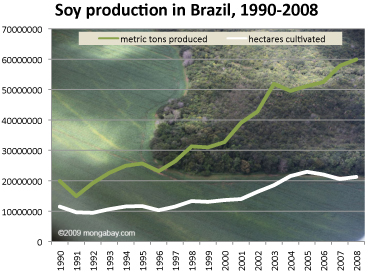Banco do Brasil, Brazil’s largest state-owned bank, announced it has joined a zero deforestation pact for soy grown in the Amazon. The bank will now require farmers applying for credit to certify the origin of their soybeans.
The soy moratorium was established in 2006 by the Brazilian Association of Vegetable Oil Industries (ABIOVE) and the National Association of Cereal Exporters (ANEC), bodies that account for 92% of Brazil’s domestic market, in response to a campaign by Greenpeace. The campaign linked animal feed used by fast food chains, supermarkets, and retailers in Europe to deforestation in the Brazilian Amazon.

|
The response was immediate. The main target—McDonalds, which had been stung by the McLibel case of the 1990s and other activist campaigns—immediately demanded its suppliers provide deforestation-free soy, presenting the industry with a daunting dilemma: move towards environmental respectability or lose one of its biggest, and most influential, customers. The largest soy players—whose vast portfolio of commodities are sold globally—chose the former, agreeing to a moratorium on soy grown on newly deforested lands that has changed the way commodities are produced in the Amazon. The moratorium has been extended every year since and has shown to be effective at reducing direct forest clearing for soy production. Registered properties are monitored via satellite, airplane flyovers, and on-the-ground visits for compliance.
The move by Banco do Brasil, which supplies much of the credit to farmers in the Amazon, strengthens the moratorium. The bank says it will also require properties to be certified before it extends credit to fund reforestation projects to bring properties up to the country’s forest code, which requires landowners in the Amazon to maintain 80 percent forest cover. The move effectively forces landowners to meet certification criteria, including having an environmental plan in place, in order to be compliant with the law.
In a statement released with the announcement, Carlo Lovatelli of ABIOVE said the moratorium has not increased soy prices—an concern among detractors— while benefiting Brazil, which can now “[cater] to the demanding international market”. Brazil is the world’s largest exporter of soy.
Related articles
Brazil’s development bank announces $588m fund to reduce agricultural emissions
(11/11/2010) Brazil’s national development bank launched a 1 billion reais ($588 million) fund that will finance projects to reduce greenhouse gas emissions associated with agriculture, reports Reuters.
Amazon soy moratorium extended
(07/08/2010) Brazilian soy farmers have extended their moratorium on Amazon deforestation for another year, reports Greenpeace.
More on Amazon soy







